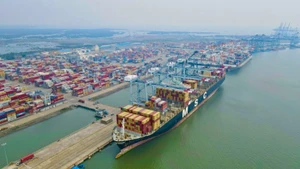Acting as financial intermediaries, banks and financial institutions are also joining hands to apply and practice ESG.
Irreversible trend
According to the State Bank of Vietnam, to date, more than 80% of banks have applied part or all of the ESG in their operations. Nearly 50% of banks have established a risk management department for lending credit capital to protect the environment.
In addition, by the end of the first quarter of 2024, 47 organisations had green credit outstanding balances with outstanding balances reaching 636,964 billion VND, accounting for about 4.5% of the total outstanding balances of the entire economy. Outstanding credit balances assessed for environmental and social risks of the credit institution system have grown steadily over the years, reaching about 2.9 million billion VND, accounting for more than 21% of the total outstanding loans of the economy.
Not only Vietnam, many other countries in the world have also been gradually recognising "green transformation" as an inevitable trend. According to economic expert Dr. Vo Tri Thanh, green transformation is an undeniable political imperative. This is not only a strong political commitment of the country, but also an imperative from the market itself, consumers demanding greener, safer; from the demands of developed countries; from finance, if not green, no loans.
About 80% of financial capital requires ESG to provide capital. For businesses, it is not just about survival or non-existence, but also about seizing many new opportunities when developing green, he added.
A recent study by DARA International also showed that Vietnam is a country that can suffer a loss of about 15 billion USD/year due to climate change, equivalent to about 5% of GDP. Therefore, with the role of financial intermediary, providing capital for the economy, more and more banks and financial institutions in Vietnam are applying ESG in practical activities to move towards the message of joining hands for sustainable development.
Pham Thi Thanh Tung, Deputy Director of the Department of Credit for Economic Sectors under the State Bank of Vietnam, said that most credit institutions have integrated environmental risk management into the current credit granting and risk management process, with 35 credit institutions having issued separate environmental risk management regulations.
Many bottlenecks need to be removed
Although it is an irreversible trend, ESG practices are in reality facing many difficulties and obstacles. Recognising the importance of ESG implementation, the State Bank of Vietnam has issued many mechanisms and policies to promote the development of green banking, green credit activities, and sustainable development.
For example, the State Bank of Vietnam issued Directive No. 03/CT-NHNN on promoting green credit growth and managing environmental and social risks in credit granting activities; Decision No. 1604/QD-NHNN approving the Green Banking Development Project in Vietnam; and recently Circular No. 17/2022/TT-NHNN guiding the implementation of environmental risk management in credit granting activities of credit institutions and foreign bank branches.
However, according to many economic experts, the legal framework related to this issue has not yet met expectations. The biggest problem at present is that there is no national common regulation on criteria and green project portfolio for industries/sectors according to the economic classification system, as a basis for credit institutions to identify and fully count green credit resources, etc.
In addition, there is still a lack of specific regulations and guidance from specialised management agencies on ESG. The novelty of the ESG concept is a factor that makes ESG governance difficult for both corporate customers and credit institutions.
Specifically, to improve the effectiveness of ESG practices in banking operations, cooperation and goodwill are required from both banks and corporate customers. However, the management capacity and strategic vision on ESG of enterprises (especially small and medium enterprises) are major barriers, causing many difficulties in the process of transforming sustainable business models and practicing ESG in Vietnam, thereby affecting the efficiency of credit granting and risk management activities of credit institutions.
To further promote ESG practices in the banking industry, in the coming time, the State Bank of Vietnam will continue to study and perfect the legal framework to strengthen the management of environmental, social and climate risks in credit granting activities of credit institutions; guide credit institutions to grant green credit, and report credit activity statistics for the national green classification list.
















